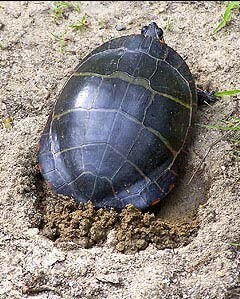A Special Place in Tilton
Conservation area along the Winnipesaukee
River June 2015...

Progress has been slow, but the area is beginning to look better every day.
Same area in 2011...

Turtle Nesting
Every spring, New Hampshire turtles go from
their winter hibernation into an egg-laying mode.
Their nesting
season lasts from May until early July. During that time, turtles
will travel more than
a quarter of a mile to reach their
nesting site. In Tilton, the newly-reclaimed area along the
Winnipesaukee
River provides places for turtle
nesting. Over the last two years, turtles have been observed laying
their eggs in several places near the river. The Winnipesaukee River
Trail Association has provided a
specific area near the trail
for turtles to nest. And, the turtles themselves have decided that
they
like a spot on the Salmon Run Conservation Area.
Several signs mark spots one female
was observed laying eggs in
mid June. Using this site means that turtles will not have to
cross the road.
New Hampshire has seven native species of
turtles. Painted and snapping turtles are relatively common,
while Blandings, spotted, wood, common musk, and box turtles are
becoming imperiled. While turtles live
from 10-50 years, females
do not lay eggs until age 15. Then they lay 20-40 eggs in soil
banks, sand, or
gravel piles. The eggs have a high risk of being
eaten by skunks, raccoons, and blue herons.
For more turtle
information:
http://www.wildlife.state.nh.us/nongame/turtles.html

Everyone should enjoy outdoor activities, but
people should also be aware of how to avoid ticks.
Here is a link to information about ticks from NHPR:
http://nhpr.org/post/things-you-should-know-about-ticks
